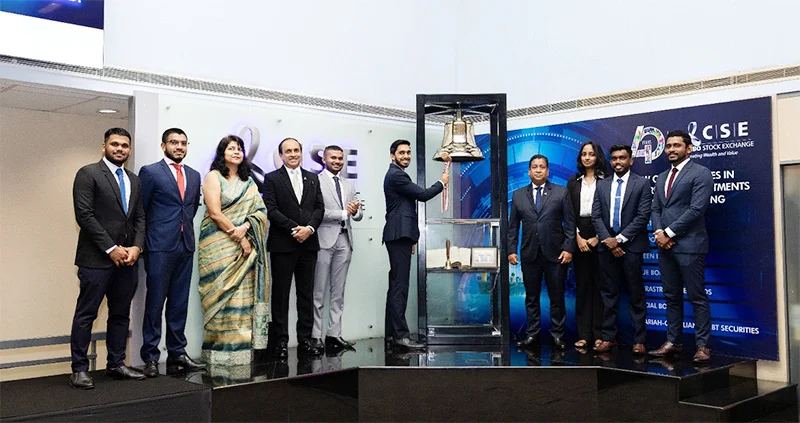Business
ComBank named ‘Most Sustainable Bank in Bangladesh’

Ends 2021 with 3 top awards and retains ‘AAA’ credit rating
Commercial Bank Bangladesh, Commercial Bank of Ceylon’s largest overseas operation, has been adjudged the ‘Most Sustainable Bank in Bangladesh’ at the close of 2021, during which the Bank was named ‘Best Foreign Bank in Bangladesh’ by two independent bodies and retained its ‘AAA’ credit rating.
The ‘Most Sustainable Bank in Bangladesh’ award was presented at the Dubai-based International Business Magazine Awards 2021 that honoured best-in-class achievements of organisations across various spheres related to international business and finance. The title recognises the sustainable and stable growth that Commercial Bank Bangladesh has demonstrated over the years.
In 2021, Commercial Bank Bangladesh was also recognised with top awards by two UK-based institutions – the Global Business Outlook (GBO) magazine and Global Economics Limited, a financial publication that recognises best performers in various financial sectors, worldwide.
Both these publications crowned Commercial Bank Bangladesh the ‘Best Foreign Bank in Bangladesh’ – a title that acknowledges the Bank’s resilience in the face of competition from local and international banks, its service excellence and dedication towards serving customers.
The Bank’s prowess in 2021 was also underlined by its ‘AAA’ (Triple A) credit rating from Credit Rating Information and Services Ltd (CRISL). This was the 11th consecutive year that Commercial Bank Bangladesh was given a ‘AAA’ long term credit rating, which is the highest credit rating given to a financial institution in Bangladesh by CRISL. The latest rating is the outcome of an in-depth analysis of the operational and financial performance of the Bank along with an assessment of relevant quantitative and qualitative factors.
Commenting on the Bangladesh operation’s achievements in 2021, Commercial Bank Managing Director and Group CEO Mr S. Renganathan said: “Despite the pandemic-caused decline in economic activity and other challenges, Commercial Bank Bangladesh has proven its mettle and stayed on the course charted for itself. The accolades and accreditations the Bank has received are affirmations of its stability, consistency in performance and service delivery. We would like to thank our stakeholders and customers in Bangladesh for their support as we celebrate the close of another successful year.”
Commercial Bank entered Bangladesh in July 2003 with the acquisition of the Bangladesh operations of Credit Agricole Indosuez (CAI), its first ever acquisition of a banking operation. The French multi-national bank operated two branches and two booths in Bangladesh at that time. Over the 18 years that followed, the Commercial Bank of Ceylon Bangladesh operation has established itself above other regional banks operating in the country with 11 branches, six SME Centres and two Offshore Banking Units.
Sri Lanka’s first 100% carbon neutral bank, the first Sri Lankan bank to be listed among the Top 1000 Banks of the World and the only Sri Lankan bank to be so listed for 11 years consecutively, Commercial Bank operates a network of 268 branches and 938 automated machines in Sri Lanka. Commercial Bank is the largest lender to Sri Lanka’s SME sector and is a leader in digital innovation in the country’s Banking sector. Besides Commercial Bank Bangladesh, the Bank’s overseas operations encompass Myanmar, where it has a Microfinance company in Nay Pyi Taw and the Maldives, where the Bank has a fully-fledged Tier I Bank with a majority stake.
Business
NDB reports all-time high earnings; doubles PAT on a normalised basis

National Development Bank PLC (hereinafter ‘the Bank’) announced its results for the financial year ended December 31, 2025 to the Colombo Stock Exchange recently. Full year results tabled by the Bank showcase a strong growth across all business lines with Net Banking Revenue increasing by a 45.2% on a comparable basis.
Like most other peers, the Bank’s 2024 financial performance was positively impacted following the successful conclusion of the ISB debt restructure with a one-off impact on interest income, fee income and net impairments amounting to LKR 1.4 billion, LKR 0.7 billion and LKR 9.4 billion, respectively for the said year.
Fund based income
Net interest income (NII), which accounts for close to 75.0% of Bank’s total operating income, grew by 6.5% on a normalised basis. Despite pressure on interest-earning assets arising from the lower interest rate environment, the Bank’s disciplined margin management helped stabilise Net Interest Margin (NIM) at 4.0% for the year. On a comparable basis, excluding one-off exceptional items, NIM stood at 4.2%, compared to 4.3% for both scenarios in 2024. By the end of the year, the Bank had close to LKR 29.3 billion in Loans and Deposits under a special arrangement with its customer(s) with a netting-off feature (end 2024: LKR 19.6 billion).
Non-fund based income
Net fee and commission income reached LKR 8.1 billion for the year – representing a growth of 14.3% from LKR 7.1 billion in 2024 excluding ISB restructuring related fees. Key growth drivers for the current year were trade finance, credit and lending, digital banking and credit and debit cards.
Credit and operating costs
Credit costs for the year amounted to LKR 5.7 billion, reflecting a substantial reduction of 57.1% compared to LKR 13.2 billion in 2024, a testament to the Bank’s strong credit underwriting practices and focused efforts on collections and recoveries. The Bank’s success on account of the latter is best reflected in notably improved stage 2 and 3 loan stock which stood at 7.9% and 10.8% respectively at end 2025 as compared with 16.6% and 14.0% at end 2024. Stage 3 provision coverage also saw further improvement to 59.1% from 54.5% during 2024 showcasing the Bank’s prudent management of credit risk.
Operating expenses closed at LKR 19.0 billion for the year, marking a 13.1% YoY increase. This increase was primarily driven by routine staff-related increments and necessary market realignments, along with higher investments in IT infrastructure and business development undertaken during the year.(NDB)
Business
PMF Finance appoints Nishani Perera as Non-Executive Independent Director

PMF Finance PLC has announced the appointment of Ms. Nishani Perera as a Non-Executive Independent Director, further strengthening the Company’s strategic oversight, governance framework, and board-level expertise as it continues to advance its transformation and long-term growth agenda.
Ms. Perera is a Fellow Member of the Institute of Chartered Accountants of Sri Lanka and brings over 19 years of experience across audit, assurance, advisory, risk management, and corporate governance. She currently serves as Partner – Audit & Assurance at Moore Aiyar and as Director of Moore Consulting (Pvt) Ltd.
Over the course of her career, Ms. Perera has gained substantial exposure to listed companies, banks, finance companies, and other regulated entities. Her areas of expertise include financial reporting under SLFRS/LKAS, audit and risk oversight, regulatory compliance, and the implementation of quality management standards. She has worked closely with Boards of Directors and Audit Committees on matters relating to financial reporting integrity, internal control frameworks, enterprise risk governance, and adherence to evolving regulatory requirements.
Ms. Perera holds a Master of Laws (LL.M.) from Cardiff Metropolitan University in the United Kingdom and a Bachelor of Science in Business Administration (Special) from the University of Sri Jayewardenepura. She is also an Associate Member of ACCA and CMA Sri Lanka, and a Fellow Member of AAT Sri Lanka.
Business
Capital Alliance deepens capital market presence with third Closed-End Fund Listing at the CSE

The units of the “CAL Three Year Closed End Fund” were officially listed on the Colombo Stock Exchange (CSE) recently. Accordingly, a total of 841,263,375 units of the ‘CAL Three Year Closed End Fund’ were listed by Capital Alliance Investments Ltd (CALI), a member of the Capital Alliance Ltd Group (CAL Group). The listing was commemorated by way of a special bell ringing ceremony on the CSE trading floor.
CSE CEO Rajeeva Bandaranaike speaking at the occasion remarked upon the rising demand for Unit Trusts: “When you look at funds, particularly unit trusts in today’s active capital market, we see a lot of domestic interest in the market with more investors entering. Funds, not only fixed income funds but also growth and balanced funds, can be the ideal vehicle through which new investors can enter the market. We see this interest reflected in the success of CAL’s Three Year Closed End Fund. More people are seeking to invest their money through professional fund managers.”
-

 Features4 days ago
Features4 days agoWhy does the state threaten Its people with yet another anti-terror law?
-

 Features4 days ago
Features4 days agoReconciliation, Mood of the Nation and the NPP Government
-

 Features4 days ago
Features4 days agoVictor Melder turns 90: Railwayman and bibliophile extraordinary
-

 Features3 days ago
Features3 days agoLOVEABLE BUT LETHAL: When four-legged stars remind us of a silent killer
-

 Features4 days ago
Features4 days agoVictor, the Friend of the Foreign Press
-

 Latest News6 days ago
Latest News6 days agoNew Zealand meet familiar opponents Pakistan at spin-friendly Premadasa
-

 Latest News6 days ago
Latest News6 days agoTariffs ruling is major blow to Trump’s second-term agenda
-

 Latest News6 days ago
Latest News6 days agoECB push back at Pakistan ‘shadow-ban’ reports ahead of Hundred auction













